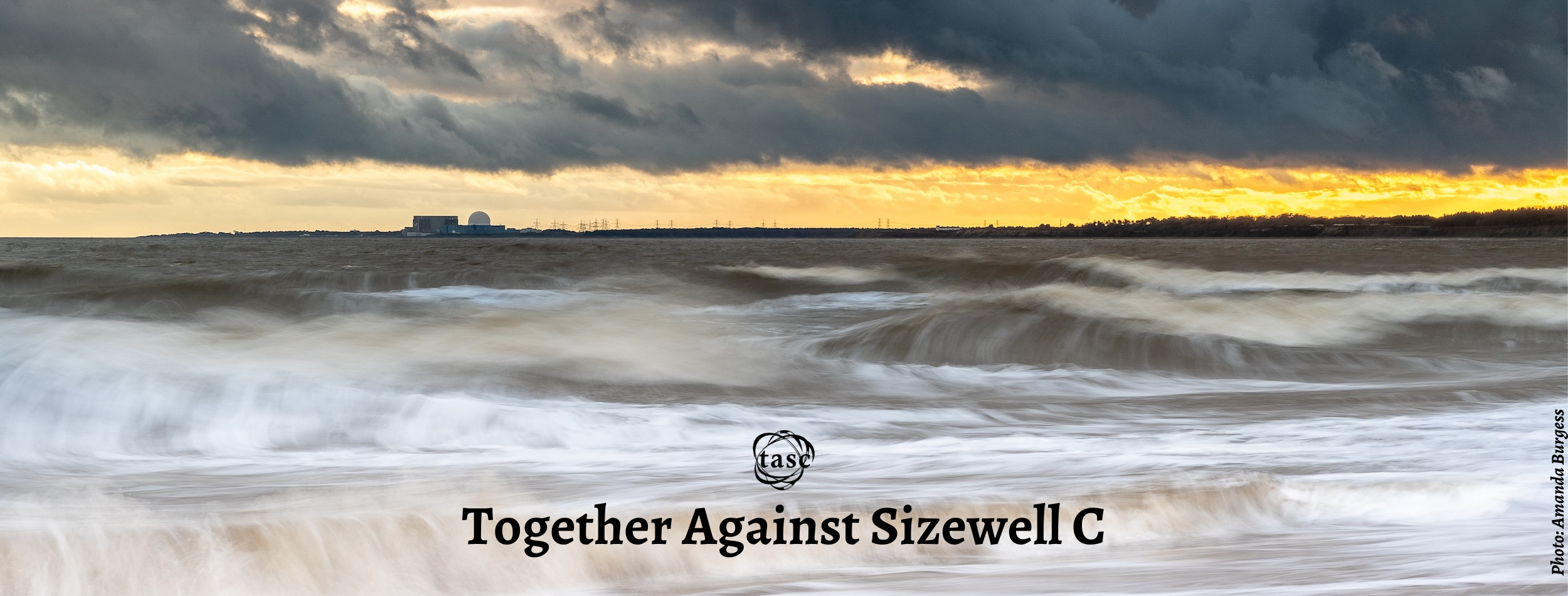

For Immediate Release
8th October 2020
EDF’s Hinkley C Nuclear Power Station will be wiping out fish stocks in
Severn Estuary for 60 years.
The Stop Hinkley Campaign is accusing EDFGenco, the French and Chinese owned Company
building Hinkley Point C, of trying to bully the UK Environment Agency into allowing them to
destroy environmentally precious fish stocks for the 60 year lifetime of the nuclear power station.
A condition placed on EDFGenco by the Environment Agency was that permission to build Hinkley
C was dependent on Acoustic Fish Deterrents (AFDs) being placed on the two massive cooling water
intake heads 3 kilometres offshore from the Nuclear site.
Now EDFGenco is trying to renege on its commitment to install AFDs and is seeking a variation on
the planning conditions imposed.
EDFGenco claims that the Centre for Environment, Fisheries and Aquaculture Science (CEFAS) the
government’s marine and freshwater science expert body – is happy for them to go ahead without
AFDs.
The Wildfowl and Wetland Trust points out that “CEFAS’s relationship as a paid contractor to
EDFGenco and an agent of Government raises unavoidable questions of conflict of interest”.
Katy Attwater, spokesperson for the Stop Hinkley Campaign says:
“EDF is up to its usual tricks of manipulating environmental laws to get planning permission and
then reneging on their promises. We at Stop Hinkley, believe they either can no longer afford to
install and maintain the Acoustic Fish Deterrents or may have had no intention to do so from the
outset. This does not bode well for Sizewell and Bradwell, EDF and Genco’s next proposed nuclear
projects, both highly sensitive environmental locations. “
The Severn Estuary and its catchment of Rivers that feed into it are one of the most important
breeding and feeding grounds for fish and birds in Europe.
The Environment Agency has now said it will not accept EDFGenco’s application for a variation to
the Development Consent Order (DCO). The Agency says it does not accept the position in the
CEFAS Report that not using an AFD would cause no negligible impact on fish stocks.
However, rather than fulfilling the original planning condition, EDFGenco is trying to get the
Agency’s decision overturned by the Planning Inspectorate.
The Stop Hinkley Campaign will be encouraging its supporters to make representations to the
Planning Inspectorate.
Stop Hinkley Contact:
Katy Attwater
07980 731896
Annexe: Environment Agency Nuclear Regulation News 7th October 2020
Hinkley Point C Update
Update on Permit Variation Application
NNB Generation Company (HPC) Limited, Hinkley Point C Power Station, Hinkley Point, near
Bridgwater, Somerset, TA5 1UD
Permit application number EPR/HP3228XT/V004
We wrote to you in June to inform you of our permitting progress. This briefing note is to update you
on recent actions taken by NNB Generation Company (HPC) Limited (NNB GenCo).
We have been determining an application from NNB GenCo to vary an environmental permit, issued
in 2013, for the discharge of turbine condenser cooling and process waters from the Hinkley Point C
site.
NNB GenCo’s application to vary its permit seeks to remove one of the measures, which is required
by the existing permit. This is for an acoustic fish deterrent (AFD) at the cooling water intake pipes in
the Bristol Channel. The AFD, together with other measures, reduce the number of fish drawn into
the cooling water system.
What is happening now?
On 4 August 2020, NNB GenCo served notice on us as it considered its application to vary the permit
had been refused because we had not yet completed our determination. This came after we shared our
provisional results of assessments carried out under the Habitats Regulations. NNB GenCo’s notice
stopped the permitting process from that date.
The Habitats Regulations ensure protection of the environment by requiring decision makers, such as
the Environment Agency, to assess the impacts of their proposed decisions on designated habitats and
species. While we had not made a final decision on the application to remove the AFD, our
provisional conclusion was that its removal, without additional mitigation measures, is unlikely to
meet the requirements of the Habitats Regulations.
On 24 September 2020 NNB GenCo told us that it had appealed to the Secretary of State against the
Environment Agency’s deemed refusal of the application to vary its permit conditions at HPC. The
appeal to the Secretary of State will be heard by the Planning Inspectorate (PINS) which has powers
delegated by the Secretary of State to deal with environmental permit appeals. As an independent
regulator the Environment Agency takes a proportionate approach but must be robust and confident in
the assessments and decisions it makes. We will carefully consider the grounds that NNB GenCo has
set out and we will respond to the appeal accordingly.
What happens next and how can I contribute?
NNB GenCo has submitted its appeal in writing to the Planning Inspectorate and requested that the
case should be heard at a Public Inquiry.
We are obliged to notify any person who is affected by, is likely to be affected by, or has an interest in
the appeal. Should you wish to make any representations on this appeal, you should do so by writing
directly to the Planning Inspectorate at the address below before close of play on 27 October 2020.
Kevin Gordon
Environment Appeals Administration
The Planning Inspectorate
3A Eagle Wing
Temple Quay House
2 The Square
Bristol
BS1 6PN
Tel: 0303 444 5000
Email the Planning Inspectorate ETC@planninginspectorate.gov.uk
Please note that we will be unable to deal with your representations during the appeal process.
What happens at a Public Inquiry?
The Planning Inspectorate is responsible for running the appeal process. One of their Inspectors will
oversee the Public Inquiry, review the evidence from all parties concerned and decide the outcome.
Please note that this is no longer an Environment Agency-led process. Our role is now to provide
evidence to the Inspector and to respond to any questions that might be raised.
Whilst the Public Inquiry is a formal procedure, it is not a court of law. The aim is for the Inspector to
thoroughly test the evidence presented by all parties, so that they can make a decision. Witnesses are
allowed to appear, present evidence and can then be cross–examined by the legal representatives of
other parties. There are no statutory rules covering appeals against environmental permits, so instead
they are heard in the ‘spirit’ of the rules that do exist for planning appeals.
Who can attend the Public Inquiry? If these can be attended
The Planning Inspectorate will decide whether to hold the hearing wholly or partly in public. They
will also decide who can speak and/or present evidence to the Inquiry. At this time, and with changing
Coronavirus restrictions in place, we are unclear what form the Inquiry will take. We will provide you
with further details when we have them from the Planning Inspectorate.
Read about Public Inquiries and the appeals process on the Planning Inspectorate’s website.
What happens after the Public Inquiry?
The Inspector will make a decision following the Inquiry. The Inspector will either uphold or reject
the appeal brought by NNB GenCo. If the appeal is upheld then the Inspector will direct us to issue a
permit and will confirm the conditions to include. The Inspector’s decision is final and once made the
Inspector can’t consider any further comments on the case.
Where can I find more information?
We have added 33 appeal documents to our Citizen Space website. The three main documents are:
- Appeal Document – Herbert Smith Freehills appeal cover letter to PINs
- Appeal Document – NNB Genco HPC Appeal Notice
- Appeal Document – NNB Genco HPC Statement of Case
The documents relating to this appeal can also be found on the Environment Agency public register.
Please ring in advance to make arrangements by calling the National Customer Contact Centre on
03708 506506 or via our website.
Please quote the permit number in your request EPR/HP3228XT/V004.
Unfortunately, we are unable to provide hard-copy documents during the current circumstances.
Information about appeals against environmental permits is on our website.

